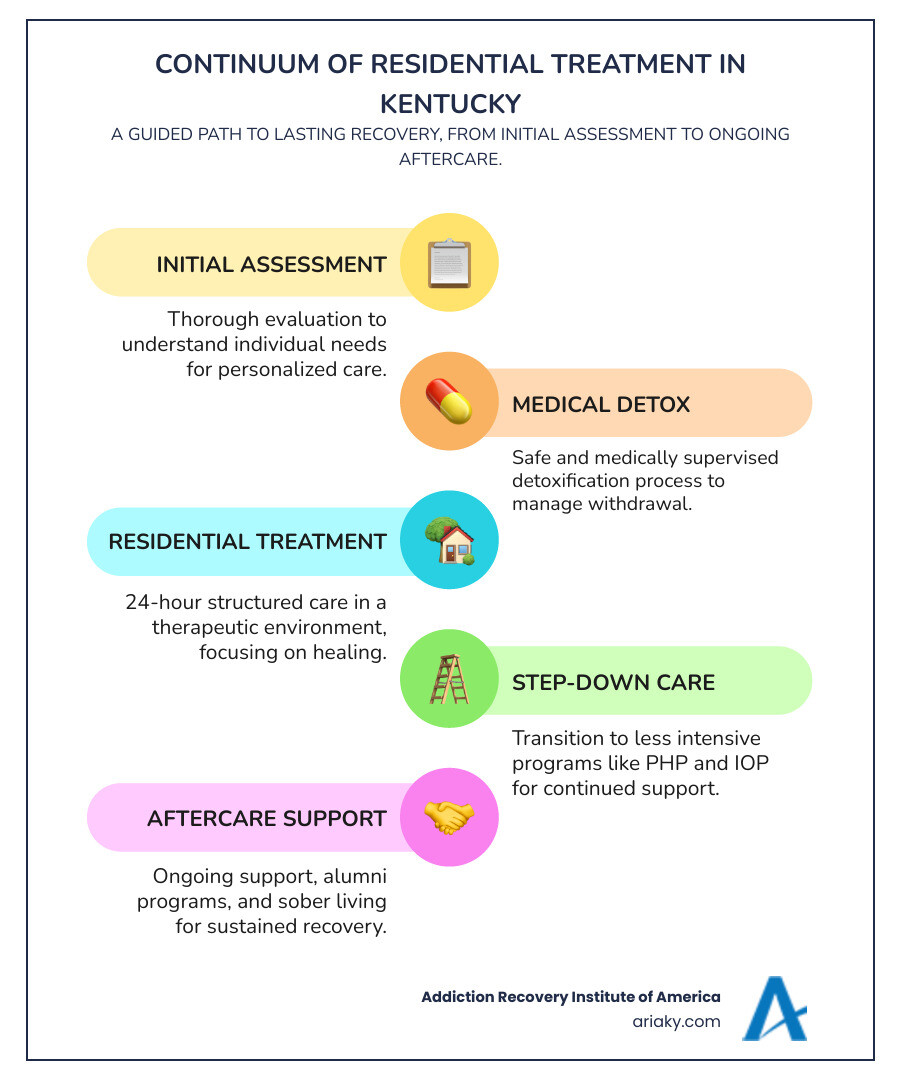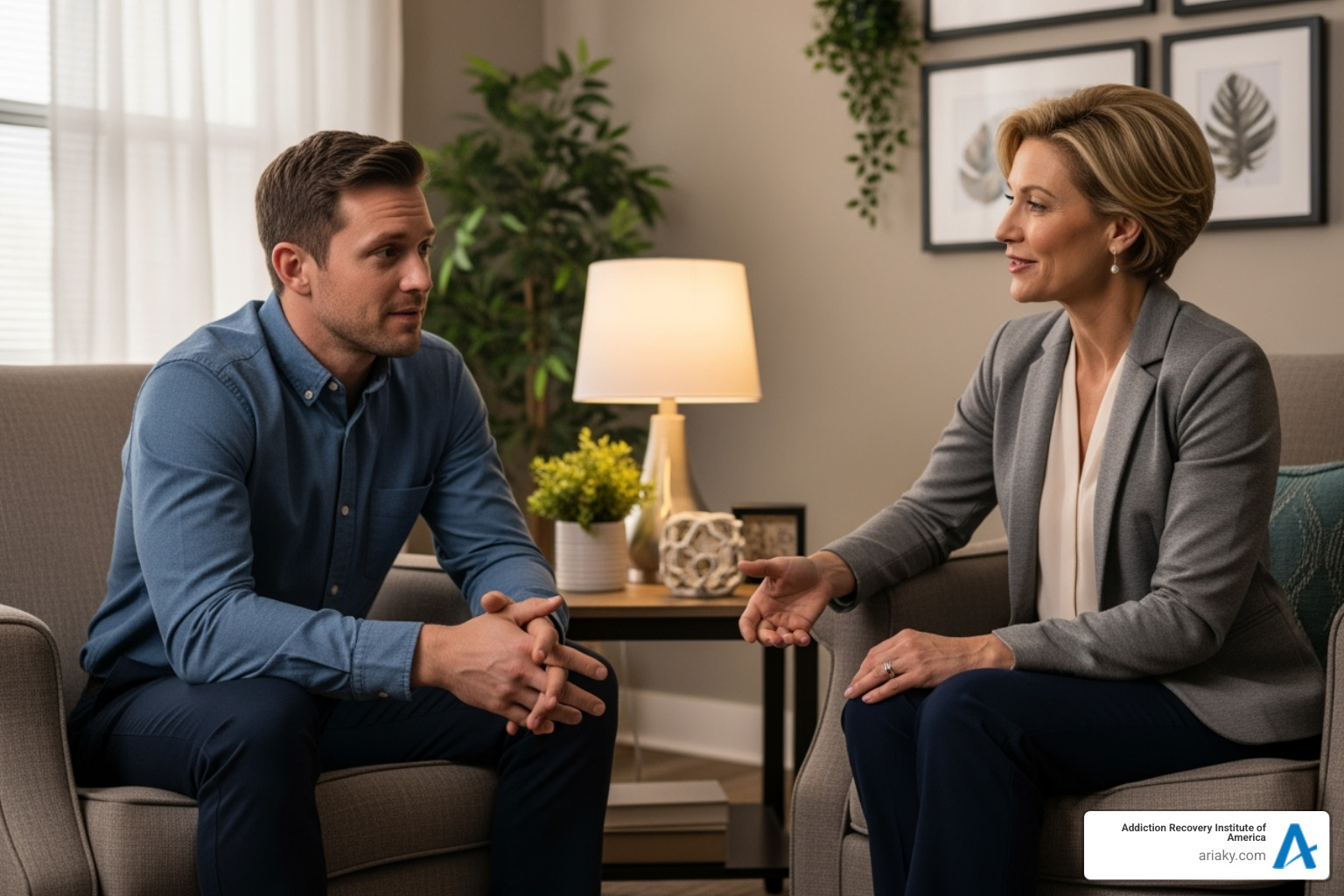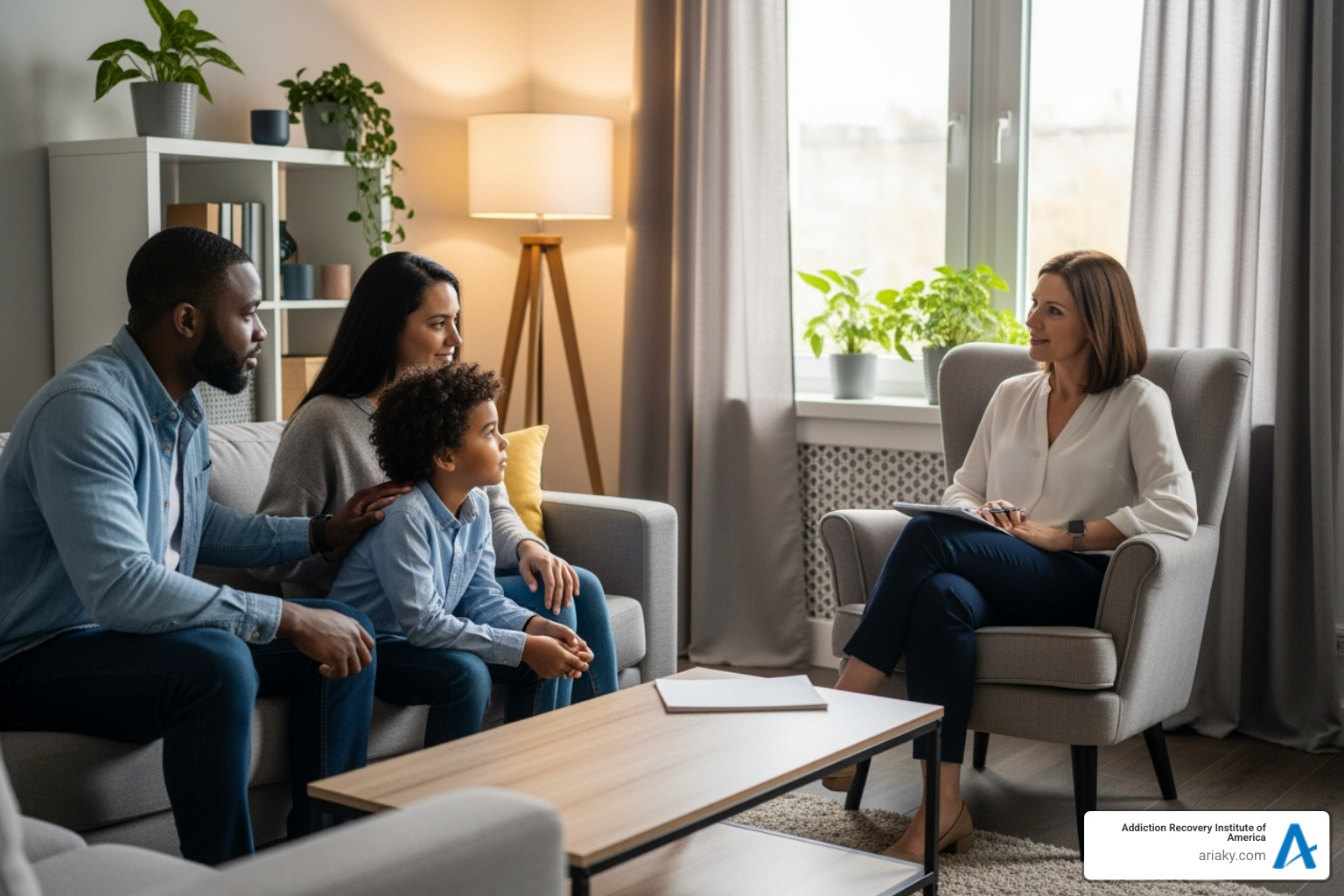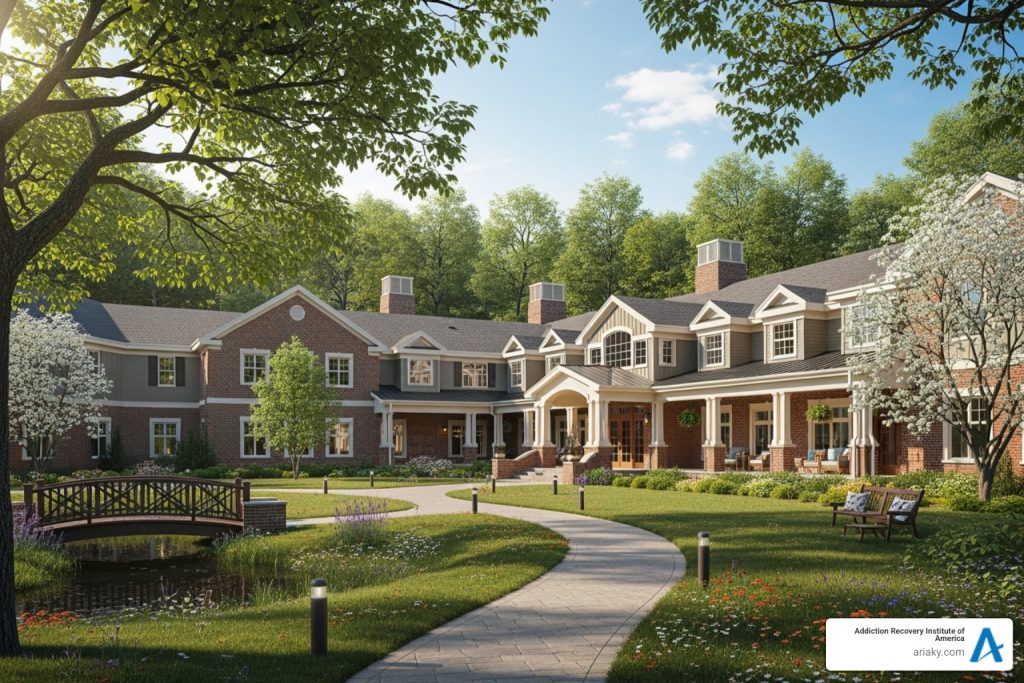Why Residential Treatment in Kentucky Provides Hope for Lasting Recovery
Residential treatment kentucky offers 24-hour medical supervision and structured therapeutic care for individuals struggling with addiction and mental health disorders. These programs provide a safe, supportive environment where clients can focus entirely on their recovery without the distractions and triggers of daily life.
Key Types of Residential Treatment in Kentucky:
- Psychiatric Residential Treatment (PRTF) – For youth ages 6-21 with severe emotional disabilities
- Substance Use Disorder Programs – Adult addiction treatment with medical detox and therapy
- Dual Diagnosis Treatment – Combined mental health and addiction care
- Short-term Programs – Typically 28-90 days for stabilization
- Long-term Programs – 6+ months for complex cases requiring intensive support
Kentucky’s residential treatment landscape includes both state-licensed facilities and private centers. The Kentucky Cabinet for Health and Family Services regulates these programs to ensure quality care standards.
As one former resident shared about their experience: “This place has saved my life! The staff and brothers here loved me back to life.” This sentiment reflects the transformative power of residential care when individuals receive comprehensive, around-the-clock support.
Whether you’re seeking help for yourself or a loved one, Kentucky’s residential programs offer evidence-based therapies, medical supervision, and the structured environment needed to break free from addiction and mental health challenges. Many facilities accept major insurance plans, including Kentucky Medicaid, making treatment accessible to those who need it most.

Navigating the Different Types of Residential Programs in Kentucky
Finding the right residential treatment kentucky program can feel overwhelming at first, but understanding your options makes the path clearer. Kentucky offers a wide range of residential programs designed to meet different needs – from young people facing serious emotional challenges to adults battling addiction and mental health issues together.
The good news is that Kentucky takes quality seriously. The Kentucky Cabinet for Health and Family Services and the Office of the Inspector General keep a close eye on all licensed facilities, making sure they meet strict safety and care standards. This oversight gives families peace of mind knowing their loved ones are in capable hands.
Most residential programs fall into two main categories: psychiatric residential treatment for youth and substance use disorder programs for adults. Many facilities also specialize in co-occurring disorders, helping people who struggle with both addiction and mental health conditions at the same time.
Program lengths vary based on individual needs. Short-term programs typically run 28 to 90 days and focus on stabilization and building a foundation for recovery. Long-term programs can last six months or more, providing extended support for people with complex situations who need more time to heal.
Psychiatric Residential Treatment for Youth
When a young person is struggling with severe emotional challenges, Psychiatric Residential Treatment Facilities (PRTFs) offer specialized care that goes beyond what outpatient therapy can provide. These aren’t hospital settings – they’re designed to feel more like home while providing the intensive, round-the-clock support that youth need to heal.
PRTFs serve as a step-down from hospitalization or as an alternative to hospitalization when less intensive care isn’t enough. They’re perfect for young people aged 6 to 21 who need more structure than they can get at home but don’t require the medical intensity of a hospital stay.
Kentucky has two main types of PRTFs. Level 1 facilities are smaller, community-based programs with up to nine beds that feel very much like a family home. These work well for youth who need intensive support but can handle a less structured environment.
Level 2 facilities provide more intensive care for young people dealing with severe aggressive behaviors, developmental disabilities, or other complex challenges. These programs have more staff and resources to handle situations that require extra attention and expertise.
What makes these programs special is their focus on trauma-informed care. Staff understand that many behavioral issues stem from past experiences, and they create safe spaces where young people can process their emotions and learn healthier ways to cope. For families seeking this level of specialized care, exploring a Kentucky Substance Abuse Treatment Center that offers integrated services can be a great starting point.
Substance Use Disorder (SUD) Residential Programs
Adult residential programs for addiction take a comprehensive approach that addresses both the physical and emotional aspects of substance use disorders. These programs understand that addiction affects the whole person, not just their relationship with drugs or alcohol.
Most programs begin with medical detox, ensuring people are physically stable before diving into the therapeutic work. Drug Detox Kentucky provides this crucial first step in a safe, supervised environment where medical professionals can manage withdrawal symptoms and any complications that might arise.
Once detox is complete, residents move into the main residential phase. Here, they’ll find Medically-Assisted Treatment (MAT) that combines medication with counseling for conditions like opioid addiction. Holistic therapies like yoga, art therapy, and mindfulness complement traditional approaches, while 12-Step facilitation introduces people to the support networks they’ll need after treatment.
What sets quality programs apart is their use of evidence-based practices – treatments that research has proven effective. These might include cognitive-behavioral therapy, trauma-focused approaches, and family therapy sessions that help repair relationships damaged by addiction.
The beauty of residential treatment is that it removes people from the triggers and stresses of daily life, giving them space to focus entirely on healing. Understanding the Benefits of an Alcohol Rehab Center can help families see why this level of care often makes the difference between short-term sobriety and lasting recovery.
Specialized Psychiatric Residential Treatment for Youth
When a young person struggles with serious emotional or behavioral challenges, specialized psychiatric residential treatment can provide the intensive support they need to heal and grow. These programs understand that children and teens have unique developmental needs, offering round-the-clock care that helps bridge the gap between hospital stays and returning home safely.

Kentucky’s residential treatment kentucky facilities for youth serve ages 6-21, with some programs accepting children as young as 4. These programs address complex needs including severe emotional disabilities, aggressive behaviors, developmental disabilities, and trauma-related issues.
What makes these programs special is their focus on trauma-informed care. Many behavioral problems in young people stem from past hurt or adverse experiences. Staff members are specially trained to recognize trauma’s impact and create healing environments where kids feel safe to work through their challenges.
Core Services and Therapeutic Models
The heart of youth residential treatment lies in its comprehensive therapeutic approach. Individual therapy gives each young person one-on-one time with a counselor to work through personal struggles. Group therapy helps them learn from peers facing similar challenges, while family therapy brings loved ones into the healing process.
Many Kentucky facilities use the Psycho-Educational Model (PEM), which focuses on helping youth manage behavioral challenges that stem from past trauma. This approach teaches practical skills for handling aggression, impulse control, and other difficult behaviors. It also addresses mental health conditions like mood disorders, ADHD, and depression.
Education doesn’t stop during treatment. Most programs offer on-site educational services through partnerships with local school districts. For example, some facilities work directly with Jefferson County Public Schools to ensure students stay on track academically while receiving therapeutic care.
Family involvement is crucial for long-term success. Programs actively include parents and siblings through family therapy sessions, educational workshops, and specialty support groups. This team approach recognizes that healing happens best when the whole family is involved. For comprehensive therapeutic support, explore Addiction Therapy Kentucky options that integrate mental health care.
The Role of a Nurturing Environment
The physical space where young people receive treatment matters tremendously. Many Kentucky facilities use family-style residential cottages instead of hospital-like settings. These cottages feel more like homes, with dedicated staff providing 24/7 support and guidance.
Daily life in these programs focuses on building essential life skills. Youth participate in daily family meetings and structured activities designed to improve social skills, self-awareness, and communication. They learn how to form healthy relationships and practice new coping strategies in a supportive environment.
Peer support plays a powerful role in recovery. When young people see others overcoming similar challenges, it gives them hope and motivation. The structured daily routines provide stability that many youth have been missing, helping them feel secure while they work on healing.
For youth transitioning from hospital stays or less restrictive environments, these programs offer the perfect stepping stone. They provide enough structure and support to ensure safety while giving young people space to practice new skills before returning to their communities.
Finding the Right Adult Residential Treatment for Addiction and Mental Health
When you’re ready to take that brave step toward recovery, finding the right residential treatment kentucky program can feel overwhelming. The good news? Kentucky offers a wide range of adult treatment options designed to meet you exactly where you are in your journey.
Every person’s path to recovery is unique, which is why individualized treatment plans form the foundation of quality care. Many adults entering treatment face both addiction and mental health challenges simultaneously – what professionals call dual diagnosis or co-occurring disorders. Rather than treating these conditions separately, the most effective programs address them together, recognizing how deeply they’re connected.

Kentucky’s residential treatment landscape includes men-only programs and women-only programs, acknowledging that gender-specific environments often improve recovery outcomes. You’ll also find faith-based programs for those whose spirituality plays a central role in healing, as well as luxury facilities that provide improved amenities for a more comfortable treatment experience.
The key is finding a program that offers a comprehensive Continuum of Care, ensuring your treatment journey flows seamlessly from initial assessment through aftercare support.
Programs for Substance Use Disorder
Adult substance use disorder programs in Kentucky provide the intensive, round-the-clock support needed to break free from addiction’s grip. Short-term residential programs, typically lasting 28 days, offer a concentrated period of healing and skill-building in a safe, structured environment.
Your days in residential treatment follow a structured daily schedule designed to maximize healing opportunities. Group therapy sessions become a cornerstone of recovery, where you’ll connect with others who truly understand your struggles. These groups aren’t just about sharing stories – they’re about building the coping strategies and support networks that will sustain your sobriety long after treatment ends.
Individual counseling provides the personal attention needed to explore the deeper roots of addiction. Meanwhile, community support groups like AA and NA meetings help you connect with the broader recovery community that extends far beyond your treatment facility.
For those struggling with opioid addiction, Medications for Opioid Use Disorder (MOUD) can be life-changing. These evidence-based treatments combine medication with counseling to reduce cravings and prevent relapse.
Some innovative programs even include vocational training components, following a ‘Crisis to Career’ model that helps you rebuild not just your health, but your professional life too. This practical approach recognizes that financial stability and meaningful work are crucial elements of lasting recovery. Exploring comprehensive Kentucky Drug Treatment options can help you find programs that address all aspects of your recovery journey.
Mental Health Residential Treatment
When mental health challenges feel too overwhelming to manage in outpatient settings, residential mental health treatment provides the intensive support you need. These programs treat a wide range of conditions including mood disorders, anxiety, trauma, OCD, bipolar disorder, and more.
The journey often begins with a thorough diagnostic assessment, sometimes lasting around 10 days, where clinicians gain a complete understanding of your mental health needs. This comprehensive evaluation ensures your treatment plan targets the right issues from day one.
Following assessment, intensive therapy programs – often lasting 28 days – provide focused healing in a supportive environment. You’ll work with trained therapists using evidence-based approaches to address your specific challenges.
Medication management plays a crucial role for many residents. On-site psychiatrists and nursing staff ensure your medications are properly administered, monitored for effectiveness, and adjusted as your needs change. This integrated approach, combining psychiatric services with various therapeutic approaches, creates the comprehensive care needed for lasting mental health recovery.
Finding quality care means looking at accredited facilities with experienced staff who understand the complexities of mental health treatment. Resources like Rehab Centers in Kentucky can help you explore your options and find the right fit for your specific needs.
Key Considerations When Choosing a Residential Treatment Kentucky Center
Choosing the right residential treatment kentucky center is one of the most important decisions you’ll make on your journey to recovery. We know this choice can feel overwhelming, but the right information can help you find the perfect fit for your needs.
Accreditation and licensing should be your first checkpoint. Look for facilities accredited by respected organizations like the Joint Commission or CARF (Commission on Accreditation of Rehabilitation Facilities). These gold-standard certifications mean the facility meets strict quality and safety requirements. Every legitimate program should also hold proper licensing from the Kentucky Cabinet for Health and Family Services.
The people caring for you matter just as much as the credentials on the wall. Staff qualifications and staff-to-client ratios directly impact your experience. Smaller ratios typically mean more personalized attention and stronger therapeutic relationships. Ask about the educational background and experience of therapists, medical staff, and support personnel.
Treatment philosophy is where facilities really differ. Some focus heavily on evidence-based practices, while others accept holistic approaches combining traditional therapy with alternative methods. At ARIA, we believe in blending the best of both worlds – using proven clinical methods while treating each person as a unique individual with their own story and needs. You can learn more about our compassionate approach at Who We Are.

Admission Criteria and Process for residential treatment kentucky
Getting into residential treatment kentucky programs requires meeting specific admission criteria. Most facilities need to establish medical necessity – meaning your situation requires the intensive, round-the-clock care that residential treatment provides. This isn’t just paperwork; it’s about ensuring you get the right level of care at the right time.
The process typically starts with an initial phone call or online inquiry. From there, you’ll go through a comprehensive pre-admission review where clinical staff evaluate your physical health, mental health status, addiction history, and any co-occurring disorders. This assessment helps determine if the program matches your specific needs.
Referrals can come from various sources – hospitals, outpatient therapists, primary care doctors, or even family members who recognize the need for intensive care. If you’re transitioning from hospital care, residential treatment offers the perfect bridge between acute medical care and returning home.
During the intake process, expect detailed questions about your medical history, substance use patterns, mental health concerns, and treatment goals. This isn’t meant to be intimidating – it’s how facilities create the most effective treatment plan for your unique situation. Ready to take the first step? Contact Addiction Recovery Institute of America to speak with our caring admissions team who can walk you through the process.
Costs, Insurance, and Financial Aid
The financial aspect of residential treatment kentucky shouldn’t prevent you from getting the help you need. Treatment costs vary widely based on program length, facility amenities, and specific services included. While we can’t provide exact numbers, understanding your payment options can ease this concern.
Private insurance often covers residential treatment, especially when medical necessity is established. Major providers like Anthem, Aetna, Humana, and other Kentucky-based insurers frequently work with treatment facilities. Kentucky Medicaid covers Psychiatric Residential Treatment Facility services for eligible youth, and many adult programs also accept Medicaid through managed care organizations.
The key is verification. Contact both your chosen facility’s financial department and your insurance provider directly to understand coverage details, copays, and any out-of-pocket expenses. Our comprehensive guide on Paying for Treatment breaks down these options in detail.
Financial aid options exist for those who need them. Many facilities offer sliding scale fees based on income, payment plans to spread costs over time, or information about grants and scholarships. Some faith-based and non-profit programs provide low-cost alternatives, making recovery accessible regardless of financial circumstances.
Evaluating Program Success and Aftercare
A quality residential treatment kentucky program doesn’t just focus on your time in their facility – they’re invested in your long-term success. When researching programs, ask about their success rates and how they define success. Some facilities track sobriety rates at 6 months, one year, or even longer periods after graduation.
Alumni programs are a powerful indicator of a facility’s commitment to ongoing support. These programs provide continued connection, mentorship opportunities, and community resources long after you complete treatment. They recognize that recovery is a lifelong journey, not a 30-day fix.
Aftercare planning should begin almost as soon as you arrive. The best programs create detailed transition plans that might include step-down care through Partial Hospitalization Programs (PHP) or Intensive Outpatient Programs (IOP). They’ll also help you find sober living support and connect with community resources.
Strong aftercare significantly improves long-term recovery outcomes. Research consistently shows that people with robust support systems and continued treatment maintain sobriety at much higher rates. Some programs report that 86% of their graduates remain sober one year later, with 75% finding meaningful employment – impressive statistics that reflect comprehensive, ongoing support.
For more information about Kentucky’s treatment landscape and aftercare options, explore our resource on Rehabs in Kentucky to understand the full spectrum of support available in your recovery journey.
Frequently Asked Questions about Kentucky Residential Treatment
How long does residential treatment typically last in Kentucky?
The length of residential treatment kentucky programs really depends on where you are in your recovery journey and what challenges you’re facing. Think of it like healing from a serious injury – some people need a few weeks, while others require months of intensive care.
Short-term programs typically run 28 to 90 days and work well for people who need stabilization and intensive therapy to get back on track. These programs pack a lot of healing into a focused timeframe, giving you the tools and support to build a strong foundation for recovery.
Long-term programs can extend from six months to over a year, especially for youth in psychiatric residential treatment or adults dealing with complex addiction and mental health issues. These longer stays allow for deeper healing and more gradual skill-building. For young people in group homes, stays often range from nine to twelve months, giving them time to develop emotional regulation and life skills.
Diagnostic programs might be as brief as 10 days, focusing on thorough assessment and immediate stabilization. These shorter programs help determine what level of ongoing care you’ll need.
The beautiful thing about quality residential treatment is that your length of stay evolves based on your individual progress. Your treatment team will work with you to determine when you’re ready for the next step in your recovery journey.
What should I do if local residential treatment kentucky options are limited?
Don’t let limited local options discourage you from getting the help you deserve. Sometimes the best treatment for you might be found outside your immediate area, and that’s perfectly okay.
Traveling for treatment can actually offer some unexpected benefits. Distance from familiar triggers gives you space to focus entirely on your healing without the daily reminders of your struggles. You won’t run into people, places, or situations that might pull you back into old patterns.
A fresh start in a new environment can feel incredibly hopeful. Many people find that being somewhere new helps them see themselves differently and accept positive changes more easily. It’s like hitting a reset button on your life.
The focused atmosphere of being away from home responsibilities and distractions allows you to dive deep into treatment work. You can concentrate on learning new coping skills and building healthy relationships without outside pressures.
If you’re exploring options beyond local facilities, More mental health resources for Kentucky can provide additional support and information about treatment options throughout the region.
How is medication managed in a residential facility?
Medication management in residential treatment kentucky facilities is handled with the utmost care and professionalism. You can feel confident knowing that trained medical professionals are overseeing every aspect of your medication needs around the clock.
On-site psychiatrists and medical doctors conduct regular evaluations to ensure your medications are working effectively. They’ll meet with you regularly to discuss how you’re feeling, adjust dosages if needed, and make changes to your treatment plan as you progress.
24-hour nursing staff takes care of the day-to-day medication administration, ensuring you receive the right medication at the right time every day. These nurses are specially trained to watch for any side effects and will immediately address any concerns that arise.
Every facility follows strict medication administration protocols to keep you safe. Your medications are securely stored, carefully tracked, and administered according to your doctor’s exact instructions. This eliminates any guesswork or mistakes that might happen when managing medications on your own.
For those dealing with opioid addiction, Medications for Opioid Use Disorder (MOUD) are seamlessly integrated into treatment. These medications work alongside counseling and therapy to give you the best chance at lasting recovery. The medical team monitors how these medications are working and makes adjustments to optimize your treatment.
This comprehensive medical oversight means you can focus on your therapeutic work while knowing that your physical health and medication needs are being expertly managed by professionals who care about your recovery.
Your Path to Recovery Starts Today
Finding the right residential treatment kentucky program may feel overwhelming at first, but taking this step shows incredible strength and courage. Throughout this guide, we’ve explored the many pathways to healing available across Kentucky – from specialized psychiatric care that helps young people overcome trauma and behavioral challenges, to comprehensive adult programs that address both addiction and mental health concerns together.
The key takeaways from our exploration reveal that successful recovery depends on finding individualized care that treats the whole person, not just the symptoms. Whether you need short-term stabilization or long-term intensive support, Kentucky’s residential facilities offer evidence-based therapies in structured, nurturing environments designed for healing.
Hope for recovery is real. Every day, individuals just like you are breaking free from addiction and mental health struggles through professional residential treatment. The testimonials we’ve shared – like the person who said their facility “loved me back to life” – remind us that change is possible when you have the right support system.
Taking the first step toward professional help can feel scary, but you don’t have to do it alone. At Addiction Recovery Institute of America (ARIA), we understand that every person’s journey is unique. That’s why our accredited and AODE-certified programs focus on individualized care designed specifically for lasting sobriety.
Our comprehensive approach includes medically supervised detoxification to help you safely begin recovery, residential treatment that provides 24-hour support in a structured therapeutic environment, Partial Hospitalization Programs (PHP) for intensive day treatment, and Intensive Outpatient Programs (IOP) that let you maintain work or family responsibilities while getting the care you need.
Your path to recovery and the life you deserve starts right now. We’re here to walk alongside you through every step of this journey, celebrating your victories and supporting you through challenges.
Begin your journey with our residential treatment program in KY


